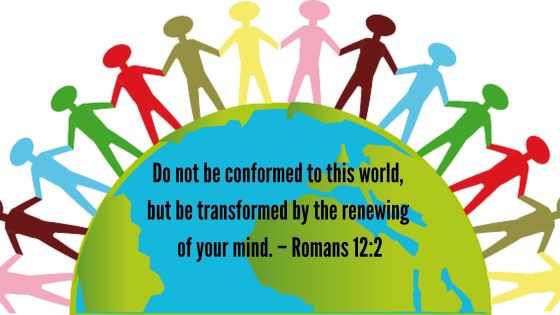While teaching believers about the essential doctrines of the faith, the apostle Paul never failed to admonish them how to live their lives as followers of Christ. Clearly, Paul had a constant concern for Christians living in the world while remaining free from the world.
Bible Verse: Ephesians 4:17-18
“This I say, therefore, and testify in the Lord, that you should no longer walk as the rest of the Gentiles walk, in the futility of their mind, having their understanding darkened, being alienated from the life of God, because of the ignorance that is in them, because of the blindness of their heart.”
In Ephesians 4:17-23, Paul used action words, such as walk, put off, and put on to describe the intentional way in which believers in Jesus Christ should live. Paul never described a passive faith but a faith that proved itself in action.
Putting Off the Old Man
When I was first ushered into my church family, I often hear our senior minister say, “We are still in the world but we should not be of this world.” And he always emphasizes how we as believers should no longer be conformed to the patterns of this world (Romans 12:2), simply because we are not citizens of planet earth but heaven (Philippians 3:20).
I never realized it in the beginning but as I listened to God’s Word through my church leaders and began reading the Bible, all these biblical truths started to sink in. Christians should start living out their faith.
Paul wrote, “You should no longer walk as the rest of the Gentiles walk” (Ephesians 4:17). Looks like he just re-worded what he told the Roman church (Romans 12:2). Paul is saying that Christians are not to imitate the life of the unsaved people around them or pattern their lifestyles on them.
These people are dead because of their disobedience and their many sins (Ephesians 2:1), while the believers have been raised from the dead and been given eternal life in Christ.
Paul went on to describe this “walk” as a way of thinking – the futility of their mind” – and behaving – given themselves over to licentiousness, to work all uncleanness with greediness” (Ephesians 4:17, 19). Their thinking and ways were futile and depraved because they were so darkened in their understanding and had hard hearts.
In general, unrepentant sinners are unable to recognize their sinful ways, their rebellion against God, and the ultimate consequences of their sins: eternal condemnation.

Loving the World and Everything in It
We cannot deny the influence of the world especially with social media and the entertainment industry. As it has always been, the world dictates what is acceptable and what is not. The world almost always controls the way people think, how they should dress up and carry themselves in public.
But the Bible gives a strong warning for Christians not to love the world or anything that is in it because everything that this world has to offer is not from God (1 John 2:15-17). Loving the world and living as the world does may gain us some rewards such as honor, prestige, and comfort. But even the best earthly rewards last only as long as we live.
Another downside to loving the world and everything in it is that love for the world is incompatible with love for the Father. So, if one claims to love both God and the world, there must be something wrong with his love for the Father.
The New Life in Christ
The Christian life must go beyond head knowledge. Of course, learning Christ must include head knowledge. But it must also include the ability to set our mind on the right things that will eventually lead us to live for and with Christ.
Christians should no longer lead a destructive, sinful lifestyle. They have been redeemed from the power of sin and even death, the penalty of sin. Through Jesus’ work on the cross, they have been reconciled to God and the Father and can obtain power from Him to resist temptation.
Subsequently, those who have truly accepted Jesus as their Savior and Lord should put off their sinful habits (Ephesians 4:22), renew their minds (Ephesians 4:23; Romans 12:2), and put on the new nature created by God for true righteousness and holiness (Ephesians 4:24).
Conclusion
Paul’s description of the life of a believer in Ephesians reveals a marvelous process, in which God works within a believer to change him or her. Relying on Jesus Christ’s saving works for us does not mean that we are inactive.
From a life filled with sin and futile efforts to gain merit before God, our lives can be transformed by our relationship with God (which has been made possible through Jesus). As Paul wrote in Ephesians 2:8-9, it is only “by grace you have been saved through faith, and that not of yourselves; it is the gift of God, not of works, lest anyone should boast.”
With Christ’s help, we can learn how to put on the “new man” who He freely provides to all who trust in Him, and will enable us to live in this world without forgetting that we are not of this world anymore.

